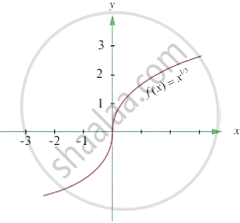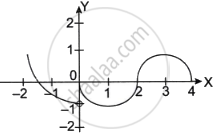Advertisements
Advertisements
Question
Consider the graph `y = x^(1/3)`

Statement 1: The above graph is continuous at x = 0
Statement 2: The above graph is differentiable at x = 0
Which of the following is correct?
Options
Statement 1 is true and Statement 2 is false.
Statement 2 is true and Statement 1 is false.
Both the statements are true.
Both the statements are false.
Solution
Statement 1 is true and Statement 2 is false.
Explanation:
Statement 1: A function f(x) is continuous at x = 0 If:
`lim_(x rightarrow 0)f(x) = f(0)`
For `y = x^(1//3)`, we have:
`lim_(x rightarrow0)x^(1//3) = 0^(1//3) = 0`
Since `f(0) = 0^(1//3) = 0`, the limit equals the function value.
Therefore, `y = x^(1//3)` is continuous at `x = 0`.
Statement 2: A function `f(x)` is differentiable at `x = 0` if the derivative exists at that point.
The derivative of `y = x^(1//3)` is given by:
`dy/dx = d/dx(x^(1//3))`
= `1/3x^(-2//3)`
Evaluating the derivative at `x = 0`:
\[\left.\frac{1}{3}x^{-2/3}\right|_{x=0}\]
As `x rightarrow 0, x^(-2//3) rightarrow oo`.
Therefore, the derivative does not exist at `x = 0`.
Hence, `y = x^(1//3)` is not differentiable at `x = 0`.
APPEARS IN
RELATED QUESTIONS
Prove that the function f (x) = 5x – 3 is continuous at x = 0, at x = – 3 and at x = 5.
Examine the continuity of the function f(x) = 2x2 – 1 at x = 3.
Find all points of discontinuity of f, where f is defined by `f(x) = {(|x|+3, if x<= -3),(-2x, if -3 < x < 3),(6x + 2, if x >= 3):}`
Find all points of discontinuity of f, where f is defined by `f (x) = {(x^10 - 1, if x<=1),(x^2, if x > 1):}`
Determine if f defined by `f(x) = {(x^2 sin 1/x, "," if x != 0),(0, "," if x = 0):}` is a continuous function?
Examine the continuity of f, where f is defined by `f(x) = {(sin x - cos x, if x != 0),(-1, "," if x = 0):}`
Using mathematical induction prove that `d/(dx) (x^n) = nx^(n -1)` for all positive integers n.
Determine the value of the constant 'k' so that function f(x) `{((kx)/|x|, ","if x < 0),(3"," , if x >= 0):}` is continuous at x = 0
Show that the function f(x) = `{(x^2, x<=1),(1/2, x>1):}` is continuous at x = 1 but not differentiable.
Find the points of discontinuity, if any, of the following functions: \[f\left( x \right) = \begin{cases}2x , & \text{ if } & x < 0 \\ 0 , & \text{ if } & 0 \leq x \leq 1 \\ 4x , & \text{ if } & x > 1\end{cases}\]
Find the points of discontinuity, if any, of the following functions: \[f\left( x \right) = \begin{cases}- 2 , & \text{ if }& x \leq - 1 \\ 2x , & \text{ if } & - 1 < x < 1 \\ 2 , & \text{ if } & x \geq 1\end{cases}\]
Discuss the Continuity of the F(X) at the Indicated Points : F(X) = | X − 1 | + | X + 1 | at X = −1, 1.
Find the point of discontinuity, if any, of the following function: \[f\left( x \right) = \begin{cases}\sin x - \cos x , & \text{ if } x \neq 0 \\ - 1 , & \text{ if } x = 0\end{cases}\]
If f(x) = `{{:("a"x + 1, "if" x ≥ 1),(x + 2, "if" x < 1):}` is continuous, then a should be equal to ______.
Find all points of discontinuity of the function f(t) = `1/("t"^2 + "t" - 2)`, where t = `1/(x - 1)`
If f(x) `= sqrt(4 + "x" - 2)/"x", "x" ne 0` be continuous at x = 0, then f(0) = ____________.
The domain of the function f(x) = `""^(24 - x)C_(3x - 1) + ""^(40 - 6x)C_(8x - 10)` is
The function `f(x) = (x^2 - 25)/(x + 5)` is continuous at x =
The function f defined by `f(x) = {{:(x, "if" x ≤ 1),(5, "if" x > 1):}` discontinuous at x equal to
The point of discountinuity of the function `f(x) = {{:(2x + 3",", x ≤ 2),(2x - 3",", x > 2):}` is are
How many point of discontinuity for the following function for x ∈ R
`f(x) = {{:(x + 1",", if x ≥ 1),(x^2 + 1",", if x < 1):}`
`f(x) = {{:(x^3 - 3",", if x < 2),(x^2 + 1",", if x > 2):}` has how many point of discontinuity
If the function f defined as f(x) = `1/x - (k - 1)/(e^(2x) - 1)` x ≠ 0, is continuous at x = 0, then the ordered pair (k, f(0)) is equal to ______.
Find the value(s) of 'λ' if the function
f(x) = `{{:((sin^2 λx)/x^2",", if x ≠ 0 "is continuous at" x = 0.),(1",", if x = 0):}`
Find the value of k for which the function f given as
f(x) =`{{:((1 - cosx)/(2x^2)",", if x ≠ 0),( k",", if x = 0 ):}`
is continuous at x = 0.
The graph of the function f is shown below.

Of the following options, at what values of x is the function f NOT differentiable?
